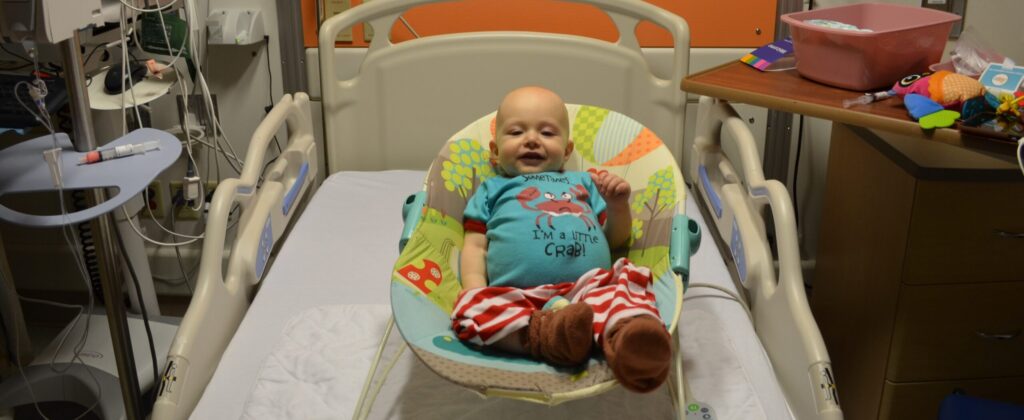
About one year ago, we found Everett’s cancer in his liver. There were no signs of him having a health issue, until one day, I noticed his belly seemed hard and he was strangely inconsolable. We found out the type of cancer, a malignant rhabdoid tumor, is one of the rarer and most aggressive cancers found in a child under 18 months. Throughout his treatment, they kept reminding us, “You can stop treatment at any time; there probably isn’t much use.” After three cycles of chemo and a surprisingly successful liver surgery, his now-metastasized cancer had taken over one-third of his lungs and we were sent home on hospice. After just three days, it was time for him to let go of this life.
This may sound crazy, but we were one of the lucky families—only a total of 3.5 months in the hospital and just a handful of days of knowing there was no hope for him. Other cancer families with a terminal diagnosis spend a year or more in-patient watching their child suffer, and up to five years fighting off disease before they ultimately have to say goodbye to their little heroes. And while 80% of children with cancer do survive in this modern day and age of medical advancements, most of them are left with life-long chronic pain, weakened immune systems, and mental anxieties. We felt blessed our child would not endure that kind of life and his suffering did not last long.
The reality for us became trying to feel gratitude amidst our suffering. My husband, Jim, and I decided the best way to heal was to look for the light within the darkness (knowing one cannot exist without the other). When we look back, we were grateful Rett was comfortable and peaceful during his last hours. There was no medical emergency or rush to save him, we were home and got to hold him and talk him through his passing, just his mama and dada by his side. Throughout this unbearable time in our life, we were completely supported by our beautiful communities of family and friends. We didn’t have another sibling at home to help understand. And Jim and I could take time to heal after because of the financial support we received. For all those reasons, we were able to accept the loss of our child knowing it would change our lives forever—but for the better.
There was one thing I knew almost certainly after Rett was diagnosed—my career as an environmental researcher would become part of my past. But I also had taught yoga for years, and knew that I enjoyed helping people live healthier lives—both mentally and physically. Now I saw a much greater purpose to my yoga philosophy training. It’s what saved me while Rett was sick and dying. It taught me to see this time of suffering as a purposeful moment in my life, and I had the choice to let it bring me down or bring about a positive transition. I knew I wanted to share the tools that helped me stay strong and focused during this harrowing experience. And with that desire, Jim and I created a foundation in our son’s honor, Rett’s Roost.
Rett’s Roost is a new non-profit organization that supports families that have heard those heart-dropping, stomach-wrenching words, “Your child has cancer.” Or even worse, “There is nothing else we can do for your child.” Our mission is to provide a sanctuary (in the form of retreats) for entire families to live, love, and heal together. We offer therapeutic ways of healing with yoga, art, music, writing, and games that build confidence and acceptance and promote lovingkindness and mindfulness. Our first two retreats were for families in the post-treatment, recovery phase—meaning their children had stable or no evidence of disease. Our first bereavement retreat—for families that have lost a child like us—is coming in December.
It’s been nearly eight months since Rett passed and only three months since Rett’s Roost became my daily “work.” I’m proud and empowered by what Rett’s Roost is becoming. While it feels like a source of healing for me, sometimes I wonder if I’m avoiding my grief. But I simply cannot ignore the super-charged angelic force behind it all—our son Everett. He came into this life to create compassion and abundance for those who need it most. And I thank him daily for his heaven-sent support and guidance. As much as I’d prefer to have him here with us, I’m glad to be doing work that has true meaning and value. I often ask myself upon waking each morning, “What can I fill the emptiness in my heart with today?” Thankfully, with all the beautiful cancer families and generous supporters we’ve met, my heart is overflowing.